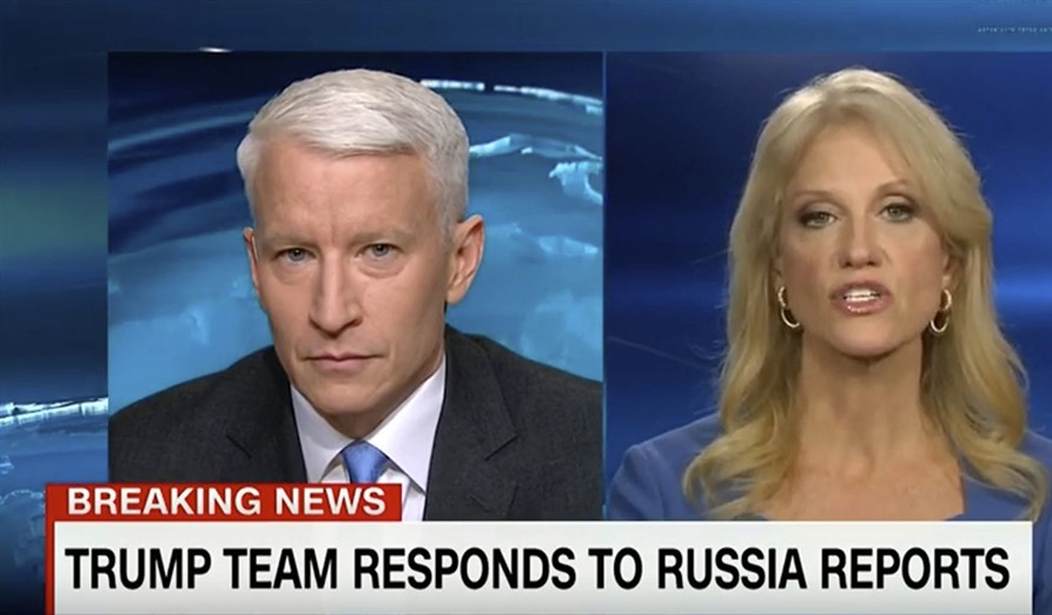When President Trump's counselor Kellyanne Conway used the phrase "alternative facts" while engaging in a verbal fistfight with Chuck Todd on "Meet the Press," the hysterics in the media saw the sky falling. (Chicken Little lives.) George Orwell's "1984" flew off library shelves as millions ran to see what Newspeak and "doublethink" were all about (or not).
Todd told Conway: "Alternative facts are not facts. They are falsehoods."
Well, not necessarily. Fudging facts -- turning them into alternatives -- is both science and art in the nation's capital. Everyone remembers President Bill Clinton's famous denial of hanky-panky in the Oval Office as depending on "what the meaning of the word 'is,' is." The Obama White House spun the most egregious example of fake facts with its assertion -- on all the networks -- that the attack on the American consulate in Benghazi by Islamic militants was inspired by an obscure American-made video, and it kept the fake facts alive for days. Everyone at the White House knew better.
The Trump White House was upset about the counting of the numbers at the inauguration, but the greater frustration was about the relentless attempt by the media to delegitimize Trump as president. But for such intemperate attention to the numbers and dramatic sparring on television, millions of eyes would have glazed over listening to the math, although everyone knew what Trump's press secretary meant when he rebuked the selective media focus on stretchers and rhetorical lies. There's a reason why Republican approval of the media is at a dismal 14 percent, though members of both parties have reasons to feel misled.
The press seriously misled the public and maligned the democratic process in the 2016 election with a foolish dependency on polling data used by both right and left to prove a point. Statistics were once reliable reference points to back up a position or policy. That's no longer true. They have lost credibility. They're regarded as suspicious actors hiding the truth, particularly when employed against conservatives, who are not expected to fight back.
Recommended
"Antipathy to statistics has become one of the hallmarks of the populist right, with statisticians and economists chief among the various 'experts' that were ostensibly rejected by voters in 2016," writes William Davies in a provocative analysis in the Guardian. There's something insulting and arrogant about how they're used.
These are not dancing numbers from Sesame Street but numbers used by politicians and pundits who thrive on insolence and affront. Statistics have become less tools for honest analysis than manipulation to make a dubious point. Statistics are out; personal stories are in.
Huge numbers of women marched in Washington and other cities the day after the inauguration to protest the election result, and it was little noted that Trump had won 53 percent of white women. White is not fashionable this season in media America, but it's still by far the largest American demographic. This statistic was nevertheless not deemed worthy of attention. After The New York Times finally asked certain women why they voted for Trump and let them answer in their own voice, one author of a letter to the editor observed that "A little more reporting like this during the campaign might have resulted in more accurate analysis of what was happening."
The quality of personal experience is more telling than the quantity of statistics. Neither pollsters nor the press told stories of women like Vicoria Czapski who "felt (Trump) had what it would take to get the country back on track," or who thought that he would help the forgotten men and women whose kids are trapped in failing schools, without access to health care and alarmed by inner-city "carnage," and pick people who would seek to do something about it. Such was not important to marching feminists and those who cater to feminists.
In the intellectual world, where standards once ruled language with precise definitions rooted in a common appreciation of reality, most debates today are ideologically driven, and even evidence based on "fact" is suspect. The tools of inquiry are damaged. Stephen Colbert of "The Colbert Report" on Comedy Central coined the word "truthiness" to describe what speakers want to be true rather than what they know is true. The Merriam-Webster dictionary a decade ago called it the word of the year. In the last election, the media, dominated by Hillary Clinton fans, suffered from acute truthiness.

























Join the conversation as a VIP Member